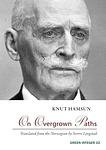Knut Hamsun
Knut Hamsun was a Norwegian writer, who was awarded the Nobel Prize in Literature in 1920. His most famous works include the novels 'Hunger', 'Growth of the Soil', and 'Pan'. Hamsun's writing is characterized by deep exploration of the human mind and a lyrical, often complex, narrative style. Despite his literary significance, his legacy is controversial due to his support of the Nazi regime during World War II.
Books
This list of books are ONLY the books that have been ranked on the lists that are aggregated on this site. This is not a comprehensive list of all books by this author.
-
1. Hunger
This novel is a psychological journey through the mind of a starving young writer in 19th century Norway. Driven by pride and stubbornness, he refuses to accept help and instead chooses to endure severe hunger and the mental and physical deterioration it causes. His struggle is not only with his physical condition but also with his own mind as he battles hallucinations, mood swings, and an increasingly distorted perception of reality. The book is a profound exploration of poverty, mental illness, and the human will to survive.
-
2. Growth of the Soil
"Growth of the Soil" is a novel that follows the life of a man who leaves his nomadic lifestyle to become a pioneer farmer in the Norwegian wilderness. The narrative traces his journey from solitude to building a family and a thriving farm, showcasing his deep connection with the land and the cyclical nature of life. The book also explores the tension between traditional rural life and modernity, as external forces such as industrialization and societal change begin to impact the protagonist's simple existence.
-
3. Pan
The novel is a lyrical exploration of the beauty and savagery of nature, set in the wild landscapes of Northern Norway. It follows the story of a solitary hunter and former military man who lives in harmony with the wilderness. His peaceful existence is disrupted when he falls in love with a young woman, leading to a tumultuous relationship that reflects the untamed and unpredictable forces of the natural world around them. The narrative delves into themes of passion, isolation, and the human longing for connection, all while painting a vivid portrait of the changing seasons and the primal allure of the forest.
-
4. Mysteries
"Mysteries" is a psychological novel revolving around the enigmatic character, Johan Nilsen Nagel, who arrives in a small Norwegian town during the summer. Nagel's eccentric behavior and profound philosophical discussions bewilder the townspeople, as he oscillates between strange actions and profound, insightful observations about humanity. His interactions with the local people, especially his love interest Dagny Kielland, reveal layers of his complex personality. The book delves into themes of existentialism, loneliness, and the inherent mystery of human nature.
-
5. On Overgrown Paths
This book is a poignant autobiographical work that delves into the author's experiences during the twilight years of his life, particularly focusing on the period of his arrest and trial for collaboration with the Nazis during World War II. Written with a reflective and introspective tone, it navigates through his thoughts, daily encounters, and the natural landscapes that surround him, offering a unique insight into his inner world and the complexities of his situation. Despite the controversies surrounding his political affiliations, the narrative is a deeply human exploration of solitude, resilience, and the enduring power of the human spirit to find beauty and meaning in the face of adversity.




